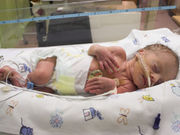Caffeine reduces both the incidence and severity of acute kidney injury
WEDNESDAY, April 4, 2018 (HealthDay News) — Caffeine administration in preterm neonates is associated with reduced incidence and severity of acute kidney injury (AKI) in the first week after birth, according to a study published online April 2 in JAMA Pediatrics.
Matthew W. Harer, M.D., from the University of Wisconsin in Madison, and colleagues conducted a secondary analysis of the Assessment of the Worldwide Acute Kidney Injury Epidemiology in Neonates study to examine the association between caffeine citrate administration and AKI in 675 preterm neonates (55.4 percent male; mean gestational age of 28.9 weeks) in the first seven days after birth (neonates born from Jan. 1 to March 31, 2014).
The researchers found that AKI occurred in 18.1 percent of neonates in the first seven days after birth and occurred less frequently among neonates who received caffeine versus those who did not (11.2 versus 31.6 percent; P < 0.01). Even after adjusting for multiple variables, receipt of caffeine remained associated with reduced odds of developing AKI (adjusted odds ratio, 0.20). For every 4.3 neonates exposed to caffeine, one case of AKI was prevented. Neonates with early AKI receiving caffeine were less likely to develop stage 2 or 3 AKI (adjusted odds ratio, 0.20).
“Caffeine administration in the first seven days after birth may be associated with less frequent AKI in preterm neonates; further studies on dosage, the timing of administration, and long-term outcomes are needed,” the authors write.
Copyright © 2018 HealthDay. All rights reserved.








